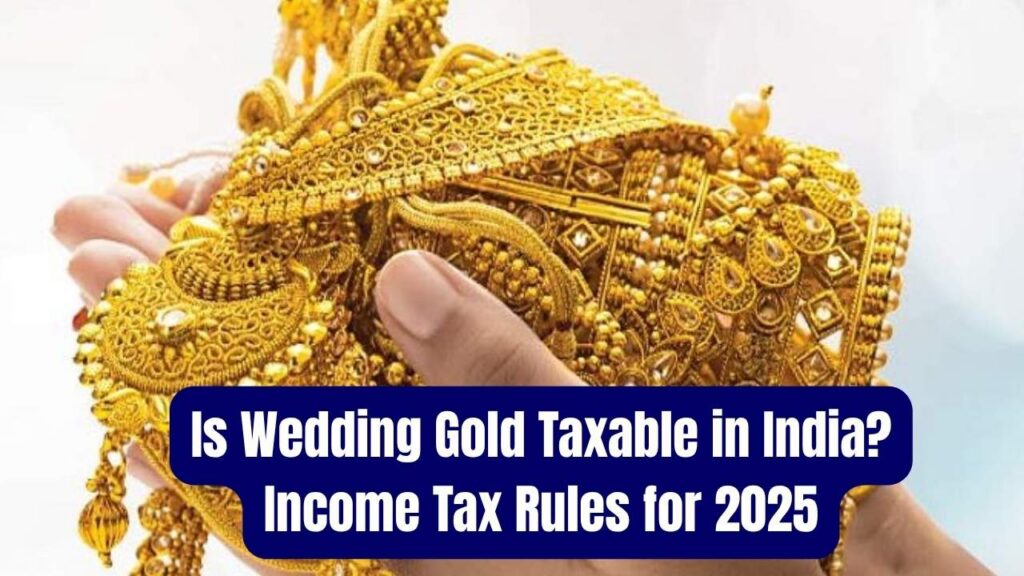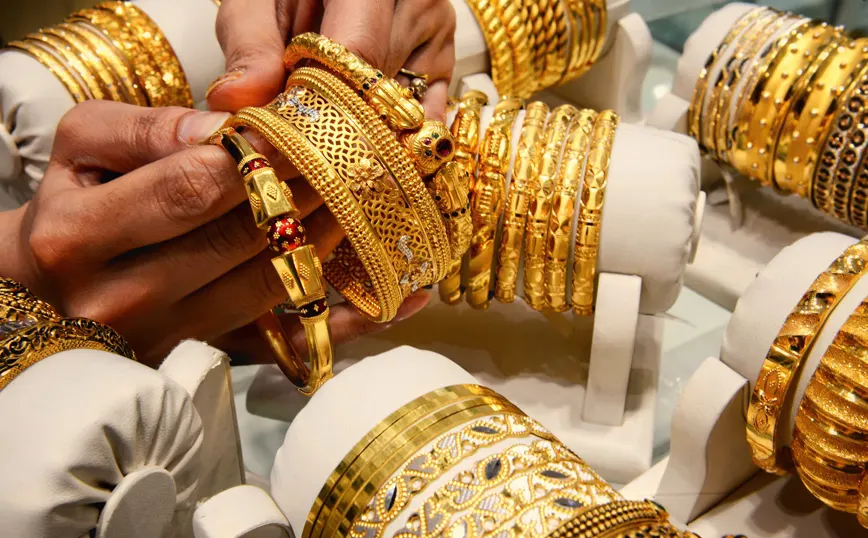Gold plays a starring role in Indian weddings. From glittering necklaces to heirloom bangles, gifting and wearing gold is an age-old tradition. But many are left wondering: “Is wedding gold taxable in India?” This question becomes especially important as income tax rules evolve year after year.
In 2025, the Indian Income Tax Act has specific provisions on gifts received during marriage, including gold. Whether you’re a newlywed receiving gold from family or a parent gifting ornaments to your child, knowing the rules helps you stay compliant and stress-free.

Wedding Gold Taxable in India
| Point | Details |
|---|---|
| Tax Status of Gold Received During Own Marriage | Completely tax-free under Section 56(2)(x) of the Income Tax Act |
| Gifts from Relatives | Tax-exempt, regardless of amount or occasion |
| Gifts from Non-Relatives (Not on Marriage) | Taxable if the total value exceeds ₹50,000 in a financial year |
| Capital Gains Tax on Sale of Gold | Short-Term (STCG) if sold within 2 years; Long-Term (LTCG) after 2 years, taxed at 12.5% without indexation (as per Budget 2024) |
| Documentation Required | Gift deed, photos, valuation certificates, wedding invitation |
| Tax on Gold Above Prescribed Limits | If gold holdings exceed acceptable limits, IT officers may inquire |
| Penalty for Misreporting | Up to 200% of tax payable under Section 270A |
| Official Resource | Income Tax India |
So, is wedding gold taxable in India? For the bride or groom – absolutely not. But others should tread carefully. The Indian Income Tax Department has clear rules, and it’s essential to maintain documentation and understand the differences between gifts from relatives and non-relatives.
By staying informed, organized, and transparent, you can enjoy your wedding festivities without any tax troubles later. If in doubt, consult a certified tax advisor to ensure you’re in the clear.
Understanding the Income Tax Rules on Wedding Gold

Section 56(2)(x): What It Means
The Income Tax Act of India, under Section 56(2)(x), lays out the rules for taxation on gifts. According to this, gifts received on the occasion of one’s own marriage are completely exempt from income tax — no matter the value or source.
So, if you’re getting married in 2025 and your relatives gift you 500 grams of gold, it’s entirely legal and not taxable. This applies whether you receive cash, jewelry, or even property.
“Your marriage is a tax-free event when it comes to receiving gifts. That’s the law.” – CA Ramesh Menon, Mumbai-based Tax Consultant
Who Qualifies as a “Relative”
To avoid any misunderstandings with the tax department, it’s crucial to know who is considered a “relative” under tax law:
- Parents
- Siblings
- Spouse
- Siblings of spouse
- Any lineal ascendant or descendant (grandparents, children, etc.)
- Spouse of the above individuals
Gifts from these individuals are always tax-free, even if given outside of your wedding.
When Gold Gifts Become Taxable

Things get complicated when gold is received from non-relatives, like friends or distant acquaintances. If the total value of all gifts from non-relatives exceeds ₹50,000 in a financial year, the entire amount becomes taxable as “Income from Other Sources.”
Example: If you receive gold worth ₹60,000 from a non-relative friend for your engagement (not wedding), you must pay tax on the full ₹60,000.
Tax Authority Checks: Gold Holding Limits
While receiving gold gifts during marriage is allowed, the Income Tax Department has guidelines on the amount of gold individuals can hold without needing to justify the source:
- Married women: Up to 500 grams
- Unmarried women: Up to 250 grams
- Men: Up to 100 grams
If you’re found with gold beyond these limits during a search, and cannot explain the source, the excess may be seized.
Additional Insights: Valuation, Inheritance, and Trends
How Is Gold Valued for Tax Purposes?
Valuation is based on the fair market value on the date the gift is received. Always get a certificate from a reputable jeweler, especially for heirloom items. This forms the cost base for future capital gains.
What About Inherited Gold?
Inheritance is not considered a taxable gift, whether it’s gold or property. But when you sell inherited gold, capital gains apply based on the original acquisition cost of the ancestor.
Changing Trends: Digital Gold and Wedding Registries
Millennials are shifting toward digital gold and curated wedding registries. While digital gold is traceable and easy to document, it is still subject to the same tax rules as physical gold. Receipts and KYC are a must.
FACT: According to a 2024 survey by KPMG India, over 27% of urban couples included digital gold in their wedding gift registries.
Cross-Border Implications: NRI Gifting Gold
If an NRI gifts gold to a relative on the occasion of marriage, it is exempt only if it is received by the bride or groom. However, one must consider:
- Import duties if the gold is brought physically
- Foreign exchange rules under FEMA
- Bank remittance records for traceability
NRI relatives should document the gift clearly via banking channels or notarized gift deeds.
Practical Advice for Gifting and Receiving Wedding Gold
1. Maintain Proper Documentation
If you’re receiving significant gold or jewelry:
- Get a gift deed signed by the giver
- Keep photos or video evidence of the wedding
- Retain valuation certificates from authorized jewelers
- Save the wedding card or e-invite
This helps you prove that the gift was for your wedding, should the Income Tax Department raise queries.
2. Parents Beware: Your Gifts Can Be Taxed
While the bride and groom can receive gifts tax-free, their parents or relatives cannot. If a parent receives a gold set worth ₹75,000 from a family friend on the occasion of their child’s wedding, this amount is taxable (since it exceeds ₹50,000 and the giver is a non-relative).
3. Selling Wedding Gold: Be Aware of Capital Gains Tax
When you sell gold received as a gift, it may lead to capital gains tax:
- Short-Term: Sold within 2 years → taxed at normal income slab rate
- Long-Term: Sold after 2 years → 12.5% tax (without indexation) as per Budget 2024
Keep track of the fair market value of gold at the time of receipt. This will be your cost basis while calculating capital gains later.
TIP: Don’t sell wedding gold immediately. Holding it for over two years can reduce your tax burden.
4. Transparency and Asset Reporting
While wedding gifts are exempt, it is wise to include large gold holdings in your Annual Information Statement (AIS) or disclose them under Schedule AL in your ITR if your income exceeds the threshold. Transparency builds trust with tax authorities.
5. Penalties for Misreporting
Misreporting the source or value of gold can lead to severe consequences:
- Penalty under Section 270A: Up to 200% of tax payable
- Possible scrutiny and interest under Sections 234B/234C
Always consult a qualified tax advisor for high-value transactions.
6. Include Professional Appraisal for Antique Jewelry
If you are receiving or gifting antique or designer gold jewelry, it is recommended to get a certified appraisal. This is especially useful in:
- Establishing higher cost basis for capital gains
- Ensuring correct insurance coverage
- Validating the gift’s value in case of scrutiny
Guide: How to Stay Tax-Compliant with Wedding Gold
Step 1: Identify the Source
Was the gift from a relative or non-relative?
Step 2: Determine the Occasion
Was it gifted on the occasion of marriage or another time?
Step 3: Record the Value
Get a proper valuation certificate to establish the fair market value.
Step 4: Maintain Proof
Collect and store all evidence, including:
- Gift deed
- Photos/videos
- Wedding invitation
Step 5: Plan Sales Carefully
If you plan to sell the gold later, consider the 2-year holding period to benefit from long-term capital gains tax rates.
Gold Monetization Scheme Stopped – Know What to Do with Your Idle Gold
RBI’s Record ₹2.7 Lakh Crore Dividend Enhances India’s Fiscal Health: SBI Report
Step 6: Optional Disclosure
If the gold value is significant, consider disclosing it in your ITR (under Schedule AL) to stay on the safer side.
FAQs: Is Wedding Gold Taxable in India?
Q1. Is gold received during my wedding taxable in India?
A: No, gold received during your own marriage is completely tax-exempt, as per Section 56(2)(x).
Q2. What if I receive gold from a friend for my birthday?
A: That will be taxable if the value exceeds ₹50,000 and the friend is not a relative.
Q3. Can my parents be taxed for receiving gifts at my wedding?
A: Yes. Gifts received by parents on the occasion of your marriage can be taxed if the value exceeds ₹50,000 from a non-relative.
Q4. How much tax do I pay if I sell wedding gold after 3 years?
A: You will pay 12.5% long-term capital gains tax (as per the 2024 budget) on the profits.







